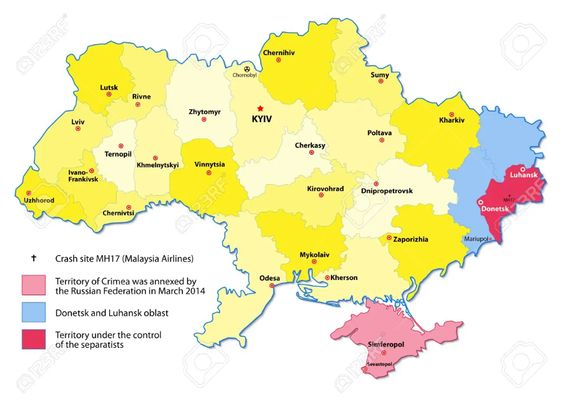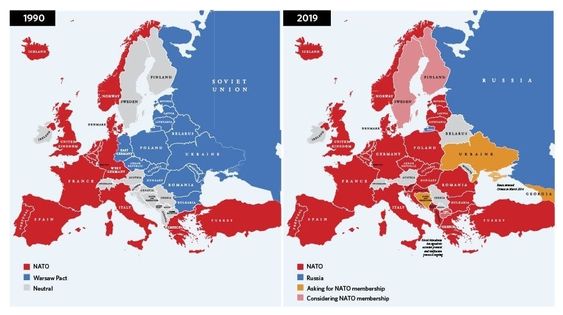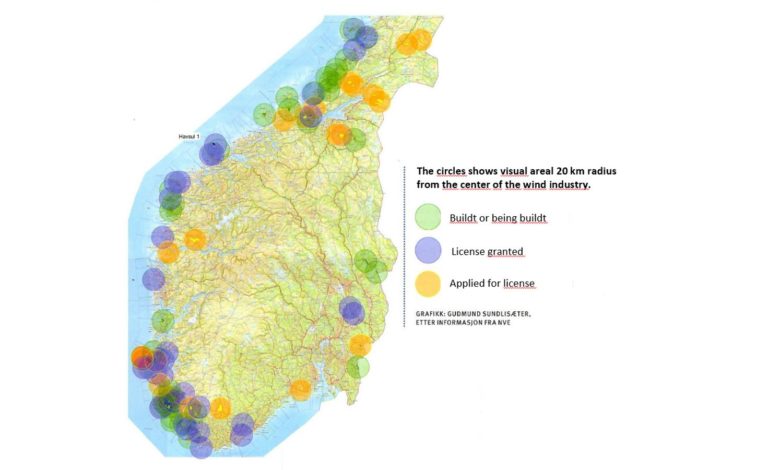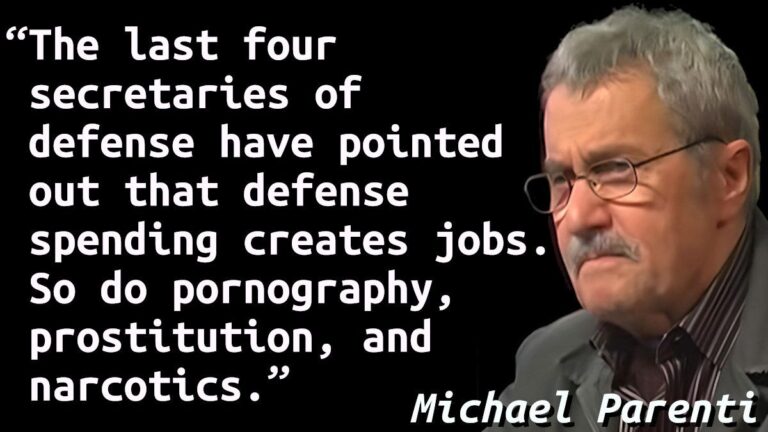
NO COLD WAR.org: The conflict in Ukraine is not new. It is the outcome of an ongoing, decades-long process of NATO expansion. In the early 1990s, the US administration of George HW Bush made repeated assurances that, following the collapse of the Soviet Union, Washington would not seek to extend NATO into Eastern Europe, Central Asia, or the Caucasus.
“We understand that not only for the Soviet Union but for other European countries as well it is important to have guarantees,” then-US Secretary of State James Baker told Mikhail Gorbachev in 1990. “If the United States keeps its presence in Germany within the framework of NATO, not an inch of NATO’s present military jurisdiction will spread in an eastern direction.”
Putin’s Munich Speech 15 years later: What prophecies have come true?
15 years after Putin’s iconic speech at Munich Security Conference. Why it is still relevant?
pic.twitter.com/hidTcRkBsN— Ignorance, the root and stem of all evil (@ivan_8848) February 10, 2022
However, since that time, 14 countries have been added to NATO’s membership list, most of them in Eastern Europe. This policy has clearly been provocative, being recognized as such even within “mainstream” US foreign policy circles. As George Kennan, the original architect of US foreign policy in the Cold War noted: “expanding NATO would be the most fateful error in American policy in the entire post-Cold War era.”

Ukraine holds a particular geostrategic importance, given that it shares a 2,000-kilometer border with Russia. In recent years, US aggression and interference have served to turn Ukraine into a major flashpoint of the new Cold War. In 2019, the US unilaterally withdrew from the Intermediate-Range Nuclear Forces Treaty of 1987, increasing the likelihood of an arms race.
The conflict in Ukraine also has an economic component. In addition to the US and EU economic sanctions against Russia, the US is threatening to expel Russian financial institutions from the international payment platform SWIFT and to block the operation of the already constructed Nord Stream 2 gas pipeline running from Russia to Germany.
Ukraine’s entry into NATO would mean the stationing of missiles, potentially with nuclear arms, only a few minutes flight time from Moscow. It is important to remember, that it was precisely this type of threat that the US would not accept and was prepared to risk world war for during the Cuban Missile Crisis.
The Russian government has made two clear proposals to resolve the crisis: first, that Ukraine never become a member of NATO; and second, that nuclear or advanced conventional weapons never be deployed in Ukraine. To date, the US has rejected these proposals, claiming that the issue at stake is Ukraine’s sovereign right to freely decide its own military alliances. Again, this is pure hypocrisy, as the US refused to accept this argument during the Cuban Missile Crisis. Is there any doubt about how the US would react if a country on its borders joined a military alliance which included Russia or China?
Other than the mention of the Minsk accords, it’s basically a carbon copy:#Georgia #Ukraine #Russia https://t.co/QuXXJrUAc4
— Julia Davis (@JuliaDavisNews) February 21, 2022
BREAKING: Vladimir Putin has declared he recognises the two separatist regions, Donetsk and Luhansk, in Ukraine as independent and has signed a decree recognising their independence.
More: https://t.co/I8u87vmXrM
📺 Sky 501, Virgin 602, Freeview 233 and YouTube pic.twitter.com/RLsc1tZPj2
— Sky News (@SkyNews) February 21, 2022
.@TaraSetmayer: “Donald Trump got impeached because he withheld #Ukraine security assistance in 2019, which was a gift to Vladimir Putin. He criticized NATO, a gift to Vladimir Putin.” https://t.co/NFy1Z7IVxR
— The Lincoln Project (@ProjectLincoln) February 20, 2022
If you’re gonna listen to any speech about #Ukraine 🇺🇦, let it be this one.
The Kenya ambassador to the UNSC perfectly explains how people across Africa understand Ukraine, and what the Kremlin’s acts of aggression mean in our post-colonial world. pic.twitter.com/0gTuAni0DC
— Thomas van Linge (@ThomasVLinge) February 22, 2022
TRANSCRIPT: Kenya, and almost every African country, was birthed by the ending of empire. Our borders were not of our own drawing. They were drawn in the distant colonial metropoles of London, Paris, and Lisbon with no regard for the ancient nations that they cleaved apart. Today, across the border of every single African country live our countrymen with whom we share deep historical, cultural and linguistic bonds.
At independence, had we chosen to pursue states on the basis of ethnic, racial or religious homogeneity, we would still be waging bloody wars these many decades later. Instead, we agreed that we would settle for the borders that we inherited. But we would still pursue continental political, economic and legal integration. Rather than form nations that looked ever backward into history with a dangerous nostalgia, we chose to look forward to a greatness none of our many nations and peoples had ever known. We chose to follow the rules of the Organisation of African Unity and the United Nations Charter not because our borders satisfied us but because we wanted something greater forged in peace. We believe that all states formed from empires that have collapsed or retreated have many peoples in them yearning for integration with peoples in neighbouring states. This is normal and understandable. After all, who does not want to be joined to their brethren and to make common purpose with them?
However, Kenya rejects such a yearning from being pursued by force. We must complete our recovery from the embers of dead empires in a way that does not plunge us back into new forms of domination and oppression. We rejected irredentism and expansionism on any basis, including racial, ethnic, religious or cultural factors. We reject it again today.
https://t.co/3myqBnYofE er en god visualisering af konflikten, særligt når krigen de næste dage går fra kold til varm. Jeg håber det ikke bliver relevant.
— Jørn Sanne-Wander (@J_VSW) February 21, 2022




25 Comments
Pingback: Russian losses in Ukraina "special military operation" - Bergensia
Pingback: รับทำวิจัย
Pingback: cv letter template
Pingback: EV Charger
Pingback: Biladd Alrafidain
Pingback: pork ruffle fat
Pingback: เว็บปั้มไลค์
Pingback: ดูซีรี่ย์ออนไลน์
Pingback: youtube automation niches
Pingback: ปั่นบาคาร่า ทดลอง คืออะไร ?
Pingback: blote borsten
Pingback: คอริ่ง
Pingback: ปั้มไลค์
Pingback: ที่พักพูลวิลล่าพัทยา
Pingback: 2 mmc pellets
Pingback: sagame
Pingback: link
Pingback: แทงหวยออนไลน์ ได้ตลอด 24 ชม. ที่ LSM99
Pingback: Diyala Info
Pingback: pk789
Pingback: click for source
Pingback: my posts
Pingback: Baト殕antトアyトア aテァ
Pingback: Learn more
Pingback: essentials